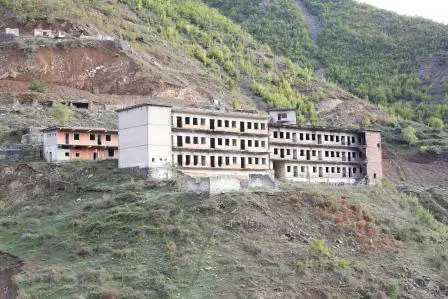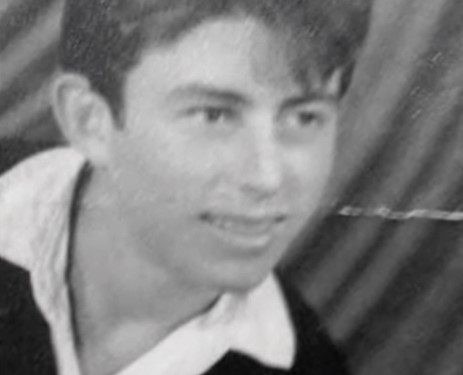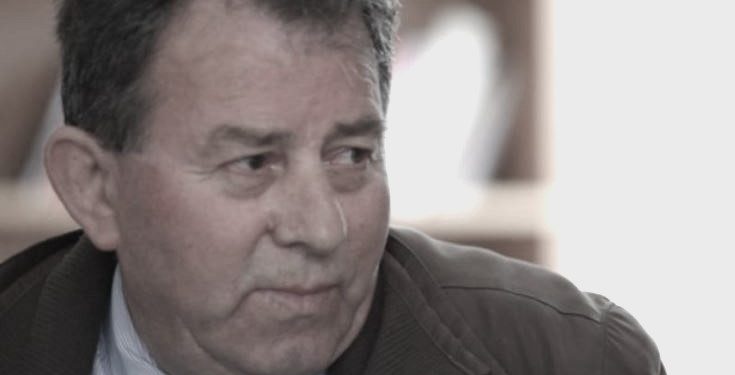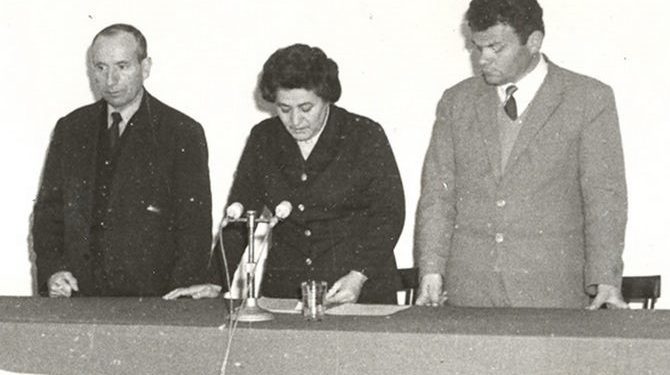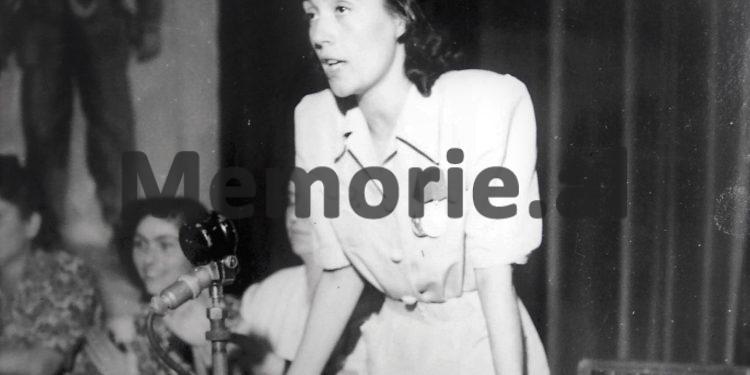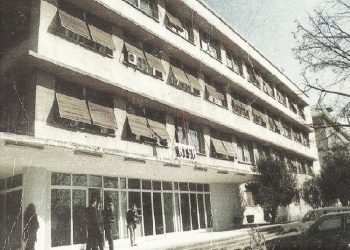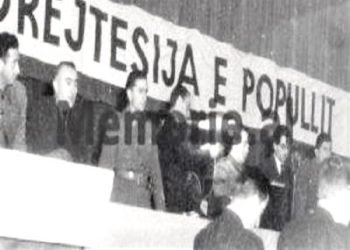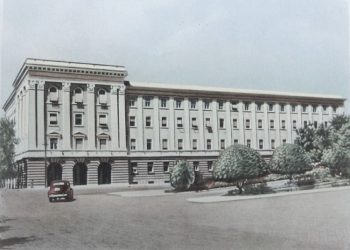By Shkëlqim ABAZI
Part eleven
SPAC
The Grave of the Living
Tirana, 2018
(My memories and those of others)
Memorie.al / Now in my old age, I feel it is my duty to tell my truth, just as I lived it. To speak of the modest men who never boasted of their deeds and of others whose mouths the regime sealed and buried them in nameless pits. In no case do I take it upon myself to usurp the monopoly of truth or to claim laurels for an event where I was a random witness, even though I tried with all my heart to help my friends, who politely and kindly avoided me: “Brother, open your eyes… don’t get involved… you only have two months and a little left!” A worry that clung to me like an amulet, from the morning of May 21, 22, and 23, 1974, and even followed me in the following months until I was released. Nevertheless, everything I saw and heard those three days, I would not want to take to the grave.
Continued from the previous issue
Between the sacks and the hands of the profiteers, you could find everything, from common items like cigarette packets, tobacco, or paper notebooks, soap, and caustic soda – not to mention food and clothing that would mold – to forbidden goods: razors and razor blades, books and stationery, mirrors, and a comb or two, even though we lacked hair, and even alcoholic beverages, which they brought out in times of crisis at exorbitant prices.
Naturally, this will provoke the reaction of critics, who will turn on me, citing the strict rules and secure prisons. And they are right, they were well-controlled, and the regulations were more than strict, such that even the slightest violation was paid for dearly. But anyone who has been through prisons knows how this invisible crew operated, with the goods they accumulated and how they managed to implicate or corrupt the police officers and some officials. The two incidents below, although four years apart – the first in Reps in the autumn of 1969 and the second in Spaç at the height of police repression, with police officers and prisoners with a penchant for trade as protagonists, and unfortunately, me as well – I hope will force the skeptics to accept the facts.
Xhafa’s Bottle
I worked in Nasho Korrozi’s brigade from the moment I was released from solitary until I was transferred to Spaç. This brigade had its area of operation on the upper plain, and all processes were carried out with three instruments: the “pickaxophone,” the “shovelophone,” and the “wheelbarrowophone,” as our Korrozi (Corrosion) liked to name them. Nashua “welcomed” me with the “shovelophone,” I believe out of fear of a shovel to the head. This very popular “tool” of the socialist era is somewhat similar to a violin bow, only it is longer and held with both hands, while the thigh on the upper part, just above the knee, served as the drum-tambourine, and the threads from cement sacks, over the patches of the trousers, served as strings.
The sounds of the “instrument” were related to the material in the score; the coarser it was, the sharper the notes came out, and when it was refined, the sounds softened in a mute. The “repertoire” was also limited, summed up in the requests of the audience (excuse me, of the police officers); for example, the “head-sonata” that earned their “bribes” was the tune of “gravel.” Following it were those of “shingle,” “earth,” “sludge,” “mortar,” “sand,” and others, which were “performed” occasionally. In the concrete season, the tune of “gravel” became fashionable, repeated daily, weekly, and even monthly.
The gravel had stones the size of footballs and clumps up to ten kilograms. During one such “concert,” I was moving the “bow” according to the memorized tune, my hands maintaining the rhythm over the calluses on my thighs even in sleep, when the handle of the “bow” (excuse me, the “shovelophone”) broke, and a spike drove deep into the palm of my left hand, hitting my phalanges (in memory of this “recital,” I have a scarred “photo” that will accompany me to the grave). Initially, I didn’t feel pain, but when we pulled the spike out, the blood flowed as if a lamb had been slaughtered. They brought me down, plastered, onto the road of “Golgotha,” where my half-patriot, Dilua, let loose on me:
– “Open your eyes; it’s a place of disaster, full of iron and rusty nails…!” The blood was gushing, and my head was buzzing from the imaginary noise. – “Stop the nonsense with the spy talk and stop the fluid that is running like a fountain, please!” I retorted, as I was not in the mood for jokes. He tried with the rags he had in his bag, but the “fountain” would not stop. – “Take him to Naim, he must have ruptured a vein, for goodness sake!” Xhaferr Dema yelled at them. But it was the middle of the day; it would be another four or five hours until the gate opened.
– “O Xhaf, I don’t have the guts to open the door because my word doesn’t carry that high, unlike yours!” Dilua scoffed and handed me a sedative. – “Have you seen Captain Jaku?” Xhafa asked someone. – “He’s in the laboratory!” the other replied. After Xhafa left, I felt faint; Dilua’s sedative was starting to take effect. I leaned against the embankment, where I lost consciousness. When I regained my senses, I saw some shadows bustling around me, among whom I recognized Xhafa, Dilo, and a couple of others. They picked me up, laid me on a tarpaulin, and headed toward the entrance, led by Captain Jaku. This convoy worried me: “I must be seriously ill for them to be carrying me like this,” because the door was only opened to transport a shortened-life individual to the morgue or a severely injured person who had met a bitter end.
Overcome by ominous thoughts, I wiggled my fingers under the reddened bandage and saw that I was capable of commanding them. At the hospital, the doctor stitched me up with three staples, gave me a sedative, and advised me to sleep. When I woke up, I heard them talking behind the door. I stretched out, but the half-open sash blocked me. Nevertheless, I recognized Xhafa’s voice, and the word “laboratory” remained fixed in my memory. Dilua came to give me the third tetanus shot, while Xhafa hovered over my head. – “How do you look, better?” When I didn’t speak, he turned to the nurse: – “Don’t bother the boy, wash him with alcohol, for goodness sake!” As he changed the bloody bandage, Dilua asked me if I felt pain. Not much, but I was troubled by a paralytic numbness from the elbow down. He refreshed me with some liquid I don’t know what, that foamed, dipped a wad of cotton into the flask of iodine, and plunged it into my palm.
– “Oh Xhaf, I’m not stingy with this, as I’ve been accepted as a son-in-law here! With you, yes, because you drink ninety-six-proof alcohol likes water!” He soaked a wad in alcohol, instructing me: – “After you throw away the bloody one, put this on the wound!” As I climbed the stairs leading to the connecting road between the camp and the construction site, Xhafa blocked my way. – “Did you get blood on that swab?” – “No, I still have this one with iodine!” – “Good, give it to me!” He took the dripping cotton and squeezed it into his mouth.
– “You’ll burn your lungs, Xhaf” – the stench blocked my breath! – “What’s to burn has been scorched long ago, for goodness sake, now just to moisten it a bit!” and he gulped it down. – “Throw it away! I don’t need it!” I told him at the dormitory door, but he still held it in his hand. – “I need it, because I’ll put it in my pocket to drink later!” and we parted. That week, Xhafa was stationed at the intersection. He would stand there and wait until I came out with the cotton wad, snatch it, and perform the same ritual.
I had often seen him at the construction site with Captain Jaku, but he worked in the “limb” brigade, where police officers gathered to warm up in the winter and for jokes in the summer, so I took the association to be a continuation of some merriment that they continued in private. No one doubted Xhafa’s honesty or his double game. He had demonstrated an unyielding character, except for the spirit of a trader. After the report, I was assigned a light job: cleaning the territory. One day, they sent me to gather the rotten planks of the silo, over twenty meters high. I was working in semi-darkness when two shadows blocked my view; they exchanged something, and one left, while the other squatted in a corner. I stopped, thinking he was relieving himself, and I didn’t say anything, so as not to embarrass him. The shadow was making strange movements, lifting and lowering something, with synchronized movements.
Meanwhile, an unusual smell permeated the furnace area and piqued my curiosity. The aroma of alcohol seemed to revive the moldy environment. I approached him from the darker side, where, besides the ticklish smell, I also heard the gurgling of the throat of the lucky one who was enjoying the forbidden drink. After every gulp, he let out an “ah” of satisfaction. I stopped still and observed the opposite corner; I say observed, but I mostly listened to the enthusiast’s “ah-s,” because you needed the eyes of an owl to see through that darkness. After a few minutes, the shadow stood up and headed toward the entrance, paused at the threshold, raised the object he held in his hand once more, let out another “ah,” and when he stepped into the light, I recognized Xhaf Dema, the father of grape spirit!
I intended to speak to him, but he took the stream that descended from the hill, took about fifty steps to where the sleeping camp met the construction site, and stopped near a bush. I thought he was going to urinate, but he looked around and around and dipped something into the bush, planted a branch of strawberry tree, and headed down toward the laboratory. As I continued cleaning, Xhafa’s conspiracy bothered me, and my brain told me to play a trick on him. Inside the bush, I found a bottle with a sour liquid and a not-very-pleasant taste that scratched my throat.
In fact, I have never been fond of drinking, but this disgusted me. “It must be plum raki,” and indeed I hadn’t been wrong; the owner would confirm: “Yes, but it has been distilled twice!” he would defend the dubious quality. I did not aim to take part of it, as I have never liked raki, neither they nor today, but I hid it in a bush further up, simply for a joke, not considering what course the event would take.
As soon as I finished the trick, the break signal was given. I climbed onto the upper platform, took my piece of bread wrapped in cement paper, and sat down with my friends. We were teasing Xhelal Beu back and forth, who was known for his pleasant humor and witty foolishness. – “What has your lady started giving you with the bread, Xhelal Beu?” someone scoffed. – “Well, she filled it up so much that I don’t know what to eat first, man!” the joker replied. – “Eat as much as you can, give the rest to the police officers!” another teased him. – “Oh man, so that a person doesn’t know where to take the surplus?!” – “To the state warehouses, Xhelal Beu!” the other continued the joke. – “They won’t accept it, because its enemy provisions, man!” – “They won’t turn up their noses at food, those skinny guys, and friend!”
– “Alright, I’m going to turn it in!” Xhelali disappeared behind the embankment, from where he returned with a bottle identical to the one I had hidden a few moments earlier. – “The devil, I hid it from Xhafa, but others are drinking it”?! My heart trembled, and I almost got up to snatch it from him, but Professor Agimi proved to be quicker: “Has the Party compensated your saving with raki, Xhelal Beu?” – “What the hell raki, professor-o, I left the provisions, they gave me piss!” – “Well, big head and a bigger cup, you came out on the same neck!” the other provoked him. – “No, man, no, I’m aiming for Qafa e Qarrit (Oak Pass), they brought me out on the neck of… gold!” Xhelali quipped back. The gong for work rang, and the jokes stopped; everyone headed to their front. But before taking two steps, the “moth” was eating at me, and I told the professor what I had messed up. – “It’s not the first time! When Xhafa craves raki, he trades his wife’s earrings for a bottle!” I learned something that others had known for ages. “Anyway, don’t tell him, let’s have some fun!” Agimi added with a laugh.
When the sun passed over the hill, Xhafa came out of the laboratory and approached the spot where he had hidden the treasure. We followed him from above, as if in the palm of our hand. We saw him approach the bush, move the green mass, go to the next one, return to the first one again, dig, then go to the next and the next, he returned and came back again and again, almost uprooting them, but he didn’t find the bottle. Then he sat down on his behind, with his head in his hands, as if struck by grief.
He stood up, went to the spot, looked around, sat down again, got up, made a circle from the bush to the silo entrance, and returned slowly, as if counting his steps. He paused for a moment, went further, stopped, and observed like explorers left at a crossroads, the choice of direction of which would determine the fate of the world and humanity, and then started from the beginning and ranted and raved…! When the professor appeared on the embankment, I could barely hold back my laughter. – “What’s wrong with you that you’re wandering around like this?” he asked, pretending to be serious.
– “I don’t even know what’s wrong with me, but I have something!” Xhafa replied exasperatedly – “You’ve lost your simit (local pastry) like Xhaferri, you poor thing!” the professor pushed. – “By God, I don’t know where I lost it!” Xhafa slipped out. – “What did you lose, man?” Agimi added the dose of sarcasm. – “That thing…! No, man, I didn’t lose anything, but I don’t know what’s wrong with me!” He quickly corrected himself and continued to examine and dig the bush with a stick in front of his feet. – “Did the wind bring you Nexhmije’s belongings, or did the paratroopers drop a bottle of raki for you, that you’re digging with a stick?!” – “By my honor, that’s what I’m looking for!” He moved to the adjacent bush and turned to Agimi: – “Professor, don’t tell me you played a joke on me!” – “Where does the spotted one allow the hairy one to eat, you dark soul! You Tirana-Dibrans did give us Gjirokastrians the bride, but you want the belongings for yourselves!” Agimi provoked him.
– “Your belt hasn’t gone to the bottom of the latrine yet, that old rag, but bring me my flask!” Xhafa pleaded clearly. – “I don’t understand, what bottle are you talking about?” The professor feigned seriousness. – “The canteen, then?” – “I have no idea at all, but you should ask Xhelal Beu, who was having diarrhea and stayed here, constantly tying and untying his waistband!” Agimi teased him. – “Don’t, man, by God, if Xhelal had found it, there wouldn’t be a bottle left, let alone raki!” Xhafa despaired and slumped his shoulders, devastated.
When I saw him in that state, I felt guilty, I almost jumped over the embankment to descend the slope and give him the bottle, even to apologize for the disaster I caused for a joke, but Agimi stopped me; he seemed determined to push Xhafa’s nerves to the limit. – “You’re a strong man, where do you find the raki! I haven’t smelled it for six years, and I’ve been craving a drop here?!” Agimi added, with his nostrils flared like a rutting goat.
– “Leave where I found it, but bring it to me!” the drinker pleaded, forcing a grin. – “You should ask Xhelal Beu!” Agimi suggested. – “Go listen to Xhelal’s farts, man!” Xhafa scowled.
Those two men were bonded by friendship and loved each other immensely, even though they constantly stung each other. The “A” in Xhafa’s mouth turned into an “O,” like all Tirana people, and the attribute came out “Xhelol,” but no one was annoyed, in fact, he was among the rare ones who got an answer even when he called him without the attribute “Beu,” so cherished by the honorable title-holder; when others, after calling him without the attribute, might face silence, but as a rule, they had to be prepared to face a stream of insults and curses, because Xhelal Beu accepted every joke, as he didn’t mean any harm, even when he hit a nerve, but he himself would jump up if you touched a few weak points concerning politics, politicians, and tradition.
He was unique in his metaphors, using simple but incomprehensible language for many ears. Those who knew him understood and imitated him, especially some exclusive phrases; others who heard him for the first time didn’t know how to translate them. When he said “tëndja” (yours-f), he meant Nexhmije Xhuglini, whom he blamed on the Dibrans, especially Xhafa, whom wicked tongues, whispered about a distant blood relation, which he denied and was offended when it was pointed out. With the phrase “të mijat” (mine-f), Xhelali meant the communist women of the South, Katina Starja, Eleni Selenica, and Naxhije Duma (Kerenxhi), as regional kin, even Fiqret, Vito, the two Liris, and countless others.
For Xhelali, the current position, political affiliation, and the end of ‘forty-four did not matter; it remained the line of demarcation. Even though tens and hundreds of communists with their children ended up in prisons, he considered them just as communist, so much so that it was difficult, if not impossible, to convince him otherwise. Although he traded with everyone, because; “even America does business with China and Russia, but they are not friends, but communists are twin chicks, hatched from the egg with two yolks, where they have grazed in the same mud!” no one could win his sympathy, no matter how much they declared themselves an enemy of the ruling clique.
That’s how he was molded, patient with friends and intolerant of opponents. This explains Xhelal Beu’s sympathies, antipathies, patience, reluctance, “loves,” and “hatred” for one or the other. When someone came from a nationalist background, he won his sympathy instantly, but when they came from the communists, even if they were made of gold, he would tear them worse than pitch. He viewed the world in black and white; I believe he went to the next world like that.
But he held Xhafa in special regard. He loved him for the jokes, for the trade and the goods they exchanged, and above all for the nationalism they both nurtured. Xhafa also valued Xhelali. He had found a true friend in him, a match, like the pot finding its lid. If he needed something, he turned to Xhelali and got it; if he needed a service, again Xhelali, and it was done; if his head hurt, Xhelali, if his stomach hurt, Xhelali, during the day Xhelali, at night Xhelali. They had spent all those years in symbiosis. Countless jokes swirled around the sympathetic pair, but the most striking one was told by Shyq Gruda:
– “One night in January, a blizzard broke out, oh Lord! Xhelal was found cutting wood on the peak of Gamozi, and the wind snatched him and tossed him into Prespa. The mule returned to the village all alone. In Prespa, one more carp surfaced, in Starje, one fewer Bey! But Prespa does not grow carp, I tell you, so it submerged him and threw him into Ohrid. Ohrid brought him out into the Drin, and the Drin snatched him to toss him into the Lake of Shkodra. Walk and walk, he reached Dibër, where a lightning bolt struck, splitting the sky, and an avalanche broke off the peak of Korab. Rolling and tumbling, the avalanche snatched Xhafa and submerged him in the Drin.
The two heroes met and started arguing. Xhafa accused him of coming to Dibër to ‘snatch Nexhmije’s belongings,’ Xhelali defended himself; ‘No, man, shut up, I can’t do anything about my women!’ But Xhafa persisted, defending the honor of the region, and by insulting and cursing, they forgot to get out on the bank, the Drin snatched them and tossed them into Bërdicë. There, Xhelali lost his feathers, and Xhafa’s raki left him; hugging each other, and since then they cannot live apart. As soon as one is released from prison, he misses his friend and curses the Party, just to return to the other. That’s how we’ll see them, arguing, despairing, and hugging, for life eternal!” the tale ended.
– “Xhelol-o, oh Xhelal Beu!” Xhafa yelled, the “o” reached the slope where Xhelal Beu was working. Someone informed him, and after a moment, he appeared on the embankment. – “What’s wrong that you’re howling like a wolf among the sheep, brother!” he retorted. – “Or have your goats scattered into the forest!” he added with a laugh. – “No, man, my goats aren’t lost, nor my sheep, but the flask!” Xhafa shot back. – “See if you’ve lost the simit, as that’s your kin, you Dibrans!”
– “I’m telling you the flask! Are you listening, you fool?” – “Full or empty!” Xhelali mocked. – “My mother’s! Well, wait a moment, let your patriot-woman heat up, and we’ll fill it and bring it to you, with hand on hip!” Xhelal Beu pushed. As was common with them, when one hit the nail and the other the horseshoe, a comical scene unfolded; while Xhafa spoke seriously, Xhelali mocked, while I, huddled at the base of the terrace, held my stomach with my hand.
– “Leave your mother alone and give me my bottle, man!” Xhafa got heated. – “Wait till I get it!” Xhelali disappeared, but after a minute, he appeared with an identical bottle to the one I had hidden; when he removed the stopper from the mouth, a thin stream flowed. – “Stop, you’re spilling it, for goodness sake! By God, it’s worth a drop of gold!” Xhafa rushed up, panting. – “What gold, man, golden piss?” When Xhafa lunged up, he added: “Don’t grieve, dear Xhafo, yours seems to have been contaminated with that of my women, and it gives off a smell that is unbearable, it fizzes like an old man’s piss!” and he shook out the last drop.
– “Come on, man, leave the pissing of your mother and your women, for goodness sake!” With the last drop, he seemed to lose his soul and melted like an ice statue under the summer heat. – “What have you done to us, Xhelolo, oh God what have you done!” – “This was for beauty, man, what’s wrong with it!” Xhelali complained to us, who were watching the scene doubled over, and he ran to the stream, filled the bottle, and stood over his friend in the blink of an eye.
– “You did me a favor, Xhelolo, I’ll keep it like an amulet!” – “What did I do to you, may you become a ball of yarn! Drink stream water, man!” he extended the bottle. – “You drink the water, I want the raki!” – “What black raki, you big-head, would I drink it without you if I had it!” – “Stop the jokes, and give me my bottle!” Xhafa pleaded. – “Take it, man, I’ve been extending it to you for an hour, and you’re beating around the bush!” He began to pour it in a stream. – “That canteen, man!” Xhafa pushed the bottle away. – “I don’t have another one, man! Did this poor guy lose his mind, Professor?” but we were nodding without answering. – “He is God’s creation, and the mind is a grain of wheat, it flies away, and you’re left without it!” Agimi said seriously. – “Give it to me, Xhelolo!” Xhafa was almost crying from bitterness over the lost item. – “What should I give to this wretched man, man? I give him water, he doesn’t want it, I give him encouragement, he doesn’t want it; all I have left is to give him Nexhmije’s belongings!” Xhelali complained to us.
– “Well, give it to him, Xhelal Beu, maybe it will help him!” Agimi teased! – “Take that belt of yours and bring it, so I can give it to Xhafa.” – “Keep that for you, I want the flask!” – “Here you go, man!” and he threw the bottle onto his knees. Xhafa grabbed it by the neck and hurled it with all his might; after a flight of several meters, the bottle shattered into a thousand pieces. – “Ugh, may you and the flask be cursed!” he burst out. – “Are you going to take revenge on the bottle, for crying out loud?! Or do you have nothing to do to the saddle and you hit the donkey!” Xhelal Beu retorted, all pouting. – “I’m telling you for the last time; give it to me, Xhelal Beu!” – “What should I give you, man, take my soul if you want!” He angrily walked away. Memorie.al




